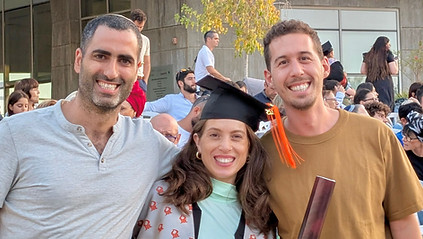PhD graduation ceremony , September 2025
Ben Gurion university, Israel
We’re proud to share that on September 9th, 2025, our very own Ophir Leshets Katzenelenbogen received her PhD after six years of hard and dedicated work, becoming the very first PhD graduate from our lab.

Change in Emotion in Psychotherapy , July 2025
Lausanne, Switzerland
On July 7–10 2025, the Change in Emotion in Psychotherapy event took place at the University Institute of Psychotherapy. The three-day program explored approaches to understanding and fostering emotional change in therapy.

Bridging Hearts: The Role of Affective Processes in Transforming Relationships , 2025
On May 29th, Prof. Eran Bar-Kalifa delivered a lecture at the - Clinical Applications of Attachment Theory and Research conference, held at the Hebrew University and organized by ICAMH.
EFT conference in Israel, 2025
On February 19th, our very own Prof. Eran Bar-Kalifa and Ph.D. student Ofra Kula delivered presentations at the Israel EFT Conference, sharing insights from our research on couples therapy using Emotion-Focused Therapy (EFT), including preliminary findings on the role of emotional processes in the transformation of relationships.
Smile Synchrony in Couples: A Subtle but Powerful Sign of Relationship Quality, 2025
We’re excited to share that our very own PhD student, Reut Machluf-Ruttner, has been featured in a recent article discussing her innovative research on smile synchrony in couples therapy. Her study explores how the subtle coordination of smiles between partners can serve as a key indicator of emotional connection and relationship quality.
In the interview, Reut delves into the science behind smile synchrony, explaining how this small but powerful nonverbal cue reflects deeper emotional attunement between partners. Her findings provide valuable insights for therapists and researchers, offering a novel way to assess progress in Emotion-Focused Couple Therapy (EFT) and enhance therapeutic interventions.

